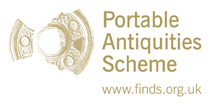File:Medieval Copper-Alloy Hawk Bell (FindID 846638).jpg

Original file (10,433 × 7,192 pixels, file size: 12.01 MB, MIME type: image/jpeg)
Captions
Captions
Summary
[edit]| Medieval Copper-Alloy Hawk Bell | ||||
|---|---|---|---|---|
| Photographer |
Colchester and Ipswich Museum Service, Sophie Flynn, 2017-05-10 14:37:20 |
|||
| Title |
Medieval Copper-Alloy Hawk Bell |
|||
| Description |
English: Complete copper-alloy sheet-metal bell, perhaps from human dress, or a dog, hawk or horse harness. The bell is made of four constituent pieces. The two halves are made from hammered copper alloy sheet and soldered together at a ridged seam running around the circumference. The suspension loop is made from a flat rectangular piece of copper alloy sheet, and has been inserted into a hole in the top of the bell. This hole has since been covered with solder to secure it in place.
The sheeting forming the body of the bell is enclosed around the fourth element, an iron pea, which is still present, though heavily rusted. Despite this, the bell still rings as the pea is not attached to the inner surface of the copper alloy sheeting and so is able to move freely. The sounding slit and two circular holes have been cut into the bottom half of the bell. The straight edges of the sounding slit are slightly bevelled. The surface of the bell shows traces of gilding. Dimensions: weight: 2.31g, diameter: 19.2mm, height: 22.9mm. A similar example dating to the late 15th century can be found in Egan and Pritchard, 1991: 338-9, number 1666. They do not appear to have come into fashion until the late 14th century (Egan and Pritchard 1991, 336) and were perhaps in common use into the early post-medieval period. A comparable example on the database is <a href="https://finds.org.uk/database/search/results/q/KENT-F84FB5">KENT-F84FB5</a>. |
|||
| Date |
between 1350 and 1600 date QS:P571,+1500-00-00T00:00:00Z/6,P1319,+1350-00-00T00:00:00Z/9,P1326,+1600-00-00T00:00:00Z/9 |
|||
| Accession number |
FindID: 846638 Old ref: ESS-316509 Filename: ESS316509.jpg |
|||
| Credit line |
|
|||
| Source |
https://finds.org.uk/database/ajax/download/id/614314 Catalog: https://finds.org.uk/database/images/image/id/614314/recordtype/artefacts archive copy at the Wayback Machine Artefact: https://finds.org.uk/database/artefacts/record/id/846638 |
|||
| Permission (Reusing this file) |
Attribution License | |||
| Other versions |
|
|||
Licensing
[edit]- You are free:
- to share – to copy, distribute and transmit the work
- to remix – to adapt the work
- Under the following conditions:
- attribution – You must give appropriate credit, provide a link to the license, and indicate if changes were made. You may do so in any reasonable manner, but not in any way that suggests the licensor endorses you or your use.
File history
Click on a date/time to view the file as it appeared at that time.
| Date/Time | Thumbnail | Dimensions | User | Comment | |
|---|---|---|---|---|---|
| current | 05:28, 16 December 2018 |  | 10,433 × 7,192 (12.01 MB) | Fæ (talk | contribs) | Portable Antiquities Scheme, ESS, FindID: 846638, medieval, page 1728, batch count 9312 |
You cannot overwrite this file.
File usage on Commons
The following 2 pages use this file:
Metadata
This file contains additional information such as Exif metadata which may have been added by the digital camera, scanner, or software program used to create or digitize it. If the file has been modified from its original state, some details such as the timestamp may not fully reflect those of the original file. The timestamp is only as accurate as the clock in the camera, and it may be completely wrong.
| Orientation | Normal |
|---|---|
| Horizontal resolution | 120 dpc |
| Vertical resolution | 120 dpc |
| Software used | Adobe Photoshop CC 2017 (Macintosh) |
| File change date and time | 14:23, 5 May 2017 |
| Color space | sRGB |
| Date and time of digitizing | 15:23, 5 May 2017 |
| Date metadata was last modified | 15:23, 5 May 2017 |
| Unique ID of original document | xmp.did:f0a3b0a5-bd71-45fa-9df0-e353ffe23e77 |

